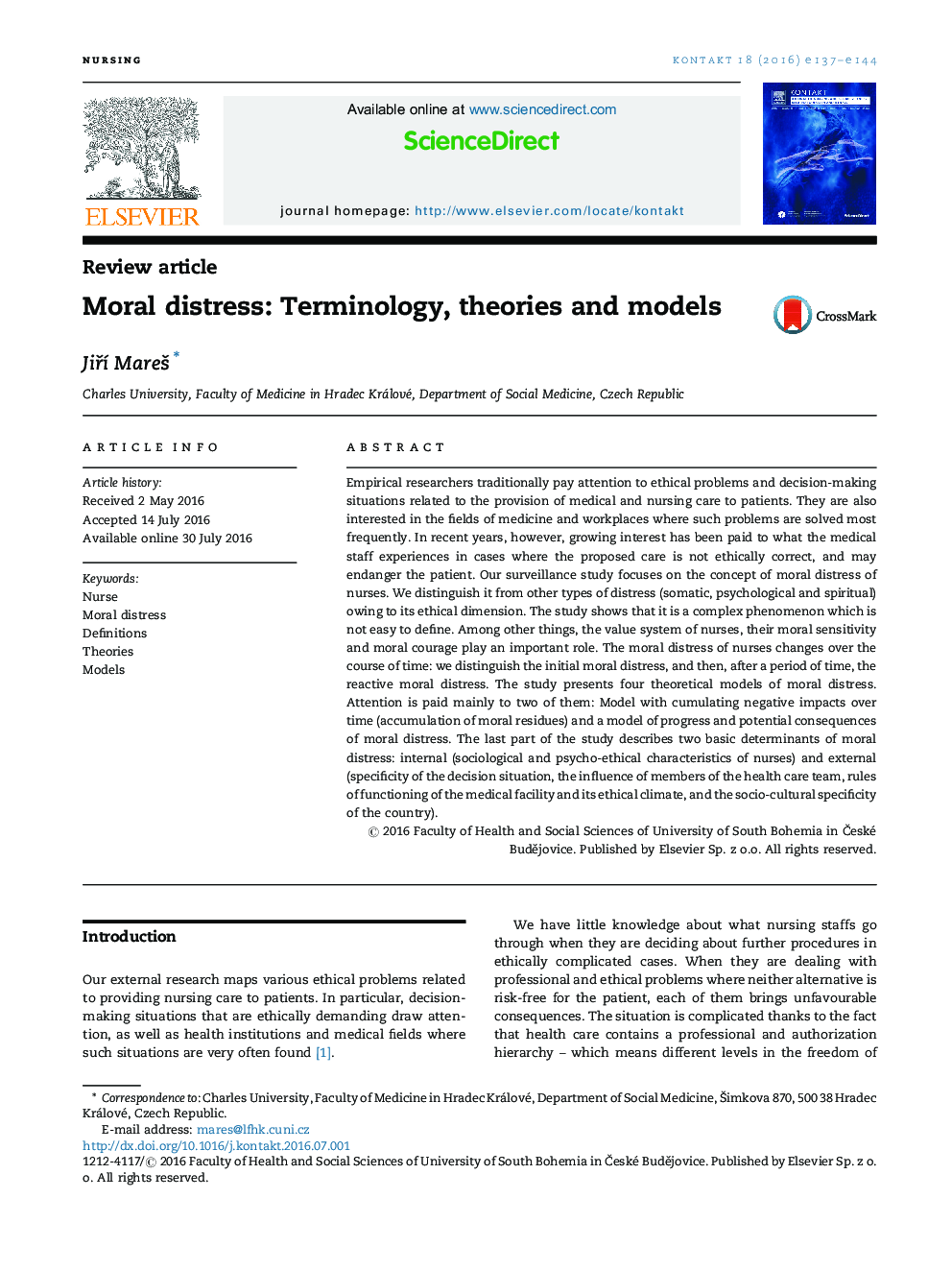| کد مقاله | کد نشریه | سال انتشار | مقاله انگلیسی | نسخه تمام متن |
|---|---|---|---|---|
| 7521730 | 1486877 | 2016 | 8 صفحه PDF | دانلود رایگان |
عنوان انگلیسی مقاله ISI
Moral distress: Terminology, theories and models
ترجمه فارسی عنوان
پریشانی اخلاقی: اصطلاحات، نظریه ها و مدل ها
دانلود مقاله + سفارش ترجمه
دانلود مقاله ISI انگلیسی
رایگان برای ایرانیان
کلمات کلیدی
پرستار، پریشانی اخلاقی، تعاریف، نظریه ها، مدل ها،
ترجمه چکیده
محققان تجربی به طور سنتی به مشکلات اخلاقی و تصمیم گیری مربوط به ارائه مراقبت های پزشکی و پرستاری به بیماران توجه می کنند. آنها همچنین در زمینه های پزشکی و محل های کاری مشغول به کار هستند، در حالی که این مشکلات اغلب حل می شوند. با این حال، در سال های اخیر، توجه به رشد کارکنان پزشکی در مورد مواردی که مراقبت های پیشنهادی از لحاظ اخلاقی درست نیست و به بیمار آسیب می رساند، پرداخت می شود. مطالعه نظارت ما بر مفهوم ناراحتی اخلاقی پرستاران متمرکز است. ما به خاطر ابعاد اخلاقی آن را از انواع دیگر پریشانی (روحی، روحی و معنوی) تمایز می دهیم. مطالعه نشان می دهد که این یک پدیده پیچیده است که به راحتی تعریف نمی شود. در میان چیزهای دیگر، سیستم ارزش پرستاران، حساسیت اخلاقی و شجاعت اخلاقی نقش مهمی ایفا می کند. اضطراب اخلاقی پرستاران در طی دوره تغییر می کند: ما اختلال اخلاقی اولیه را تشخیص می دهیم و سپس پس از یک دوره زمانی، پریشانی اخلاقی واکنشی. این مطالعه چهار مدل نظری از پریشانی اخلاقی ارائه می دهد. توجه به طور عمده به دو نفر از آنها پرداخته می شود: مدل با تأثیرات منفی تجمعی در طول زمان (انباشت بقایای اخلاقی) و یک مدل پیشرفت و پیامدهای بالقوه رنج اخلاقی. آخرین بخش مطالعه دو عامل اساسی پریشانی اخلاقی را توصیف می کند: ویژگی های داخلی (ویژگی های جامعه شناختی و روحی اخلاقی پرستاران) و خارجی (ویژگی وضعیت تصمیم، نفوذ اعضای تیم مراقبت های بهداشتی، قوانین عملکرد پزشکی تسهیلات و محیط زیست اخلاقی و خصوصیات اجتماعی و فرهنگی کشور).
موضوعات مرتبط
علوم پزشکی و سلامت
پزشکی و دندانپزشکی
سیاست های بهداشت و سلامت عمومی
چکیده انگلیسی
Empirical researchers traditionally pay attention to ethical problems and decision-making situations related to the provision of medical and nursing care to patients. They are also interested in the fields of medicine and workplaces where such problems are solved most frequently. In recent years, however, growing interest has been paid to what the medical staff experiences in cases where the proposed care is not ethically correct, and may endanger the patient. Our surveillance study focuses on the concept of moral distress of nurses. We distinguish it from other types of distress (somatic, psychological and spiritual) owing to its ethical dimension. The study shows that it is a complex phenomenon which is not easy to define. Among other things, the value system of nurses, their moral sensitivity and moral courage play an important role. The moral distress of nurses changes over the course of time: we distinguish the initial moral distress, and then, after a period of time, the reactive moral distress. The study presents four theoretical models of moral distress. Attention is paid mainly to two of them: Model with cumulating negative impacts over time (accumulation of moral residues) and a model of progress and potential consequences of moral distress. The last part of the study describes two basic determinants of moral distress: internal (sociological and psycho-ethical characteristics of nurses) and external (specificity of the decision situation, the influence of members of the health care team, rules of functioning of the medical facility and its ethical climate, and the socio-cultural specificity of the country).
ناشر
Database: Elsevier - ScienceDirect (ساینس دایرکت)
Journal: Kontakt - Volume 18, Issue 3, September 2016, Pages e137-e144
Journal: Kontakt - Volume 18, Issue 3, September 2016, Pages e137-e144
نویسندگان
JiÅà MareÅ¡,
